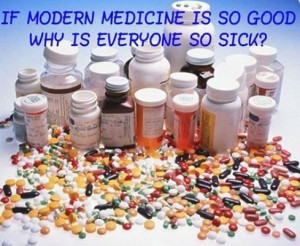No serious medical practitioner can now deny that mind and body are one. In the 1980s scientists such as Dr Candace Pert proved that thoughts travel along the nerves to the muscles, organs and tissues, influencing the process by which cells are renewed and that meanwhile, cells continually send messages to the brain.
The mind can make us ill, and it can make us well. A state of peace and well-being creates healthy cells; anxious states do the opposite. Negative thoughts can give rise to all manner of conditions. Beliefs are simply collections of thoughts to which give sanction, so be careful what you think and say about your body. If you hear yourself saying, ‘You’re a pain in the neck’ or ‘this is a real headache’ don’t be surprised if you get one!
In her book, ‘Positive Thinking,’ Vera Pfeiffer relates the incredible tale of a convicted murderer in the United States who chose to have his wrists cut rather than go to the electric chair. The poisoned was blindfolded, a warden traced across his wrists with a feather. He died instantly. There are similar stories of African tribesmen when witch doctors pointed a ‘magic’ bone at them. It’s not the bone that killed them, but their belief in the power of the witchdoctor.
If you are unwell and don’t believe that you will recover, your belief (not the illness) can prevent you from getting well. Norman Cousins, who cured himself of a terminal illness after doctors had given up on him, wrote:
‘Drugs are not always necessary. Belief in recovery always is.’
Those who believe that illness is a sign of failure on their part or a punishment for mistakes made in this and previous lives heal the slowest of all.
What we can learn from placebos
Placebos are pills and potions with no active ingredients (i.e. ‘active’ in the conventional sense). They are often used in clinical trials as ‘controls’. One group takes the test drug, the other a placebo, and the outcomes are compared. It is not unusual for the improvement to be similar in both groups. Some patients even get the same side effects from placebos as if they had taken the actual medication.
The main factor in successful healing with placebos is the belief of the patient, hence the size, shape and colour of the tablets influence results, as does the healing procedure. Anything that makes the treatment seem more credible, such as the doctor’s bedside manner, improves the placebo effect. Placebos are least effective when the patient is unconscious or unaware of what is going on.
Placebos tell us something important about the mind-body connection. They are rarely used these days because doctors consider it unethical to tell patients a pill has an active ingredient when it hasn’t. Pity. How much potential for safe, effective healing is being lost?
The biochemical revolution has almost run its course
Understanding the relationship between beliefs and health will be among the greatest advances in medical science in the coming century. The biochemical revolution of the last sixty years has almost run its course and will one day – soon – be seen as ‘old medicine’ as doctors look elsewhere for solutions to intractable medical problems.
©David Lawrence Preston, 1.11.2016
Follow me on Facebook and Twitter @feelinggoodatt
Visit www.AcuPearl.co.uk


Leave a Reply